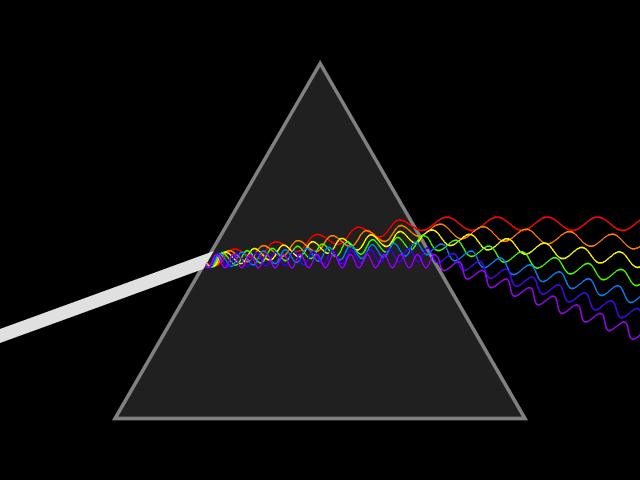
Source An example of Entropy: (Light Waves through a Prism)
In today's world-view,
science has taken the place of God...
...but some philosophical
problems are still troubling.
Take free will.
This problem has been around
since Aristotle, in 350 B.C.
St. Augustine and Thomas Aquinas
worried how we can be free...
...if God already knows
what we're gonna do.
Nowadays, we know the world works
by fundamental physical laws.
These laws govern the behavior
of every object in the world.
Since these laws are trustworthy, they
enable technological achievements.
We're physical systems too. Complex
arrangements of carbon, mostly water.
Our behavior isn't an
exception to these laws.
So whether it's God setting things up
in advance and knowing everything...
...or physical laws governing us,
there's not much room for freedom.
You might want to ignore
the mystery of free will.
To say, "It's a historical
anecdote, it's sophomoric.
It's a question with no answer.
Forget about it."
But the question remains. If you think
about individuality, who you are...
...is based on the free choices
you make. Or take responsibility.
You're only held responsible
or admired or respected...
...for things you do
of your own free will.
The question keeps coming
and we have no solution.
Decisions can seem like charades.
Imagine it. There's electrical
activity in the brain. Neurons fire...
...sending a signal through the nerves
into the muscle fibers. They twitch.
You reach out your arm.
It looks like a free action...
...but every part of that process...
...is governed by physical laws.
Chemical, electrical, and so on.
It looks like the big bang
set the initial conditions...
...and the whole
rest of human history...
...is the reaction of subatomic
particles to basic physical laws.
We think we're special,
we have dignity.
That now is threatened.
It's challenged by this picture.
You might say, "What about quantum
mechanics? I know enough...
...to know it's a
probabilistic theory.
It's loose, not deterministic.
It lets us understand free will."
But if you look at details
it won't really help...
...because you have quantum particles,
and their behavior is random.
They sort of swerve.
Their behavior is absurd...
...and unpredictable. We can't
study it based on what came before.
It has a probabilistic framework.
Is freedom just
a matter of probabilities?
Randomness in a chaotic system?
I'd rather be a gear in
a deterministic, physical machine...
...than some random swerving.
We can't ignore the problem. We must
find room in our world-view for persons.
Not just bodies, but persons.
There's the freedom problem...
...find room for choice and responsibility
and understanding individuality.
we cling, we tense we produce force based on instinct or memory
just one thing
what about fun, what about our unique sensitivity and our unique curiosity that matches perfectly to our ability
when we tune that, grow that practice that, we may know joy
we become un predictable in our action and our creations surprise and delight even our "selves".
really we have just tuned our fascia and synapses to be sensitive or one with a small part of something vast - not self but fractal, and much better than terminal anyway...
when we become a collection of rigid opinions - opposite, then we are dreamy and reactive, we get upset easily - then we are automaton.